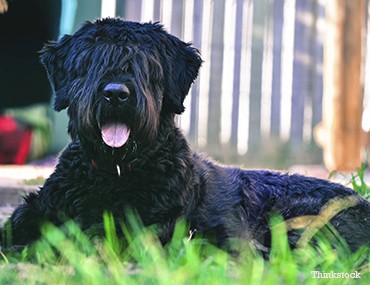Background:
The Bouvier des Flandres originated in the farmlands of what is today Belgium. They were built to work, not to be shown, and very few records were kept on lineage. At the time the dogs were more commonly known as vuilbaard (dirty breed), or koehond (cow dog), later their name was changed to Bouvier meaning “cowherd.” Important jobs given to the Bouvier included pulling carts, driving cattle, and general work around the farm. They had no breed standard and were available in all sizes and colors.
World War I nearly led to the extinction of the Bouvier, who was used in combat as an ambulance and messenger. The breed was saved as a result of an extensive breeding program and one particular dog named Nic de Scottegem, whom nearly all modern day Bouvier’s can be traced back to. World War II decimated the breed once again but the resilient Bouvier survived.
The first breed standard was written in 1912 but was in debate for years after that. The American Kennel Club recognized the breed in 1929.
Sizing up:
- Weight: 70 to 110 lbs.
- Height: 23.5 to 27.5 inches
- Coat: Double coat
- Color: Fawn, salt, pepper, gray, brindle
- Life expectancy: 10 to 15 years
What’s the Bouvier des Flandres like?
The Bouvier des Flandres was a working class dog and still needs plenty of exercise to stay healthy and satisfied. She certainly has the instincts of a herding breed and would love nothing more than to use these skills on a regular basis. With that in mind be sure your Bouvier isn’t nipping at the heels of children when they run by.
The Bouvier’s temperament is excellent. She will generally be calm and polite with a can-do attitude and the stamina to match. She loves her people and will be naturally protective of them around strangers. She might show aggression around strange dogs as well but should do okay with dogs she’s known all her life.
When it comes to training the Bouvier it’s important that you establish yourself as dominant early in the relationship. Without the respect of your dog you certainly won’t have her attention. After that, training should be relatively simple. The Bouvier is intelligent and used to taking commands. Be careful you’re not repetitive though, the Bouvier’s intelligence means she can be bored easily.
The Bouvier would love to have space to run around in, especially on a farm. She could be a suitable apartment dog providing you meet her exercise needs with a daily walk.
Health:
The following health conditions might affect the Bouvier:
- Hyperthyroidism
- Laryngeal paralysis
- Cancer
- Subaortic stenosis
- Bloat
Takeaway Points:
- The Bouvier is sweet, loving and will be loyal to her family.
- The Bouvier needs lots of exercise.
- The Bouvier might be aggressive towards unknown dogs or people.
- The Bouvier is intelligent.
If you have any questions or concerns, you should always visit or call your veterinarian – they are your best resource to ensure the health and well-being of your pets.
